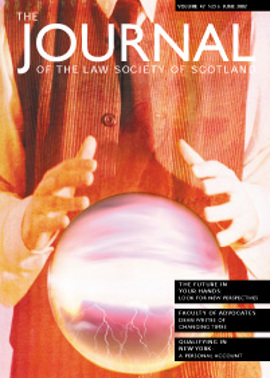Plain speaking
One reason may be to do with the way we were (and are?) introduced to the daily task of writing letters. How many trainees learned to write by individual guidance and training from their employer? And how many were, instead, encouraged or forced to ferret their way through fusty files to almost blindly copy letters in the hope they would do the job? The flaws in this last approach were part of life’s rich tapestry and a learning experience all rolled into one. I well remember the barbed reply from the lawyer acting for a house seller pointing out there would not be a property factor for a detached bungalow in Bearsden. Oops!
But even if the young lawyer picked up the right legal approach, he also picked up and adopted language he would never have dreamed of using before. It was not how he would naturally write. But this language was the language of lawyers and – so the thinking went - you had to use it if you wanted to be taken seriously.
Another reason is that, like most professions, we use technical words and expressions as a type of shorthand. This may be acceptable when we are writing to one another. But what happens when we write to clients; do we make enough of an effort to clean up our act and communicate in plain language? And how often do we know that our jargon filled letter to the other side is (a) bound to be shown to the clients on the other side, anyway and (b) best shown to our own clients, too?
Shouldn’t we be making more of an effort – no matter to whom we are writing – to use plain language? Of course we should. The use of plain language is a challenge that we should all take up sooner rather than later. As Bryan Garner says: “If we want the respect of the public, we must learn to communicate simply and directly.”
In the coming issues, I will use this column to offer some practical suggestions and advice about using plain language as well as giving useful sources for extra help. In this small way, hopefully you will be encouraged to take up the challenge of plain language reform.
In this issue
- Opinion
- No room for complacency
- The future in your hands
- MDPs: why not?
- A bite out of the Big Apple
- Traps for clients and advisers
- Peer to peer websites – heathen chemistry?
- Legal services through a market lens
- Back on the case
- Website reviews
- Visions of a reasonable observer
- Professional risks – self assessment
- In practice
- Europe
- Plain speaking
- Book reviews






